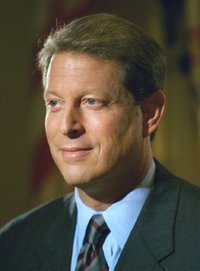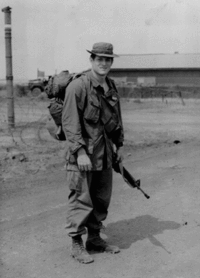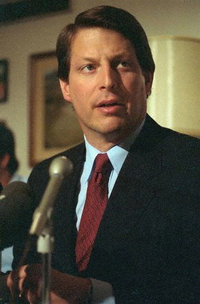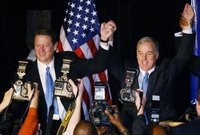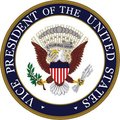Al Gore
|
|
| Order: | 45th Vice President |
|---|---|
| Term of Office: | January 20, 1993 – January 20, 2001 |
| Preceded by: | Dan Quayle |
| Succeeded by: | Dick Cheney |
| Date of Birth | March 31, 1948 |
| Place of Birth: | Washington, DC |
| Wife: | Mary Elizabeth "Tipper" Gore |
| Profession: | Journalist, Businessman |
| Political Party: | Democrat |
| President: | Bill Clinton |
Albert Arnold Gore Jr. (born March 31, 1948) is an American Democratic politician who served as the 45th Vice President of the United States from 1993 to 2001. He ran for President in 2000 following Bill Clinton's two four-year terms, but was defeated by the Republican candidate George W. Bush in a closely contested election. While Gore won the popular vote, Bush won the majority of electoral votes to become President. Electoral votes are allocated by the results in the individual states, while the popular vote refers to the total number of ballots cast. Because the close vote in the state of Florida was disputed in court, many Americans believe Gore was the rightful winner of the electoral vote as well.
Gore currently serves as President of Current, Chairman of Generation Investment Management, and sits on the board of directors of Apple Computer. He is also considered by many political pundits to be a front runner for the 2008 Democratic nomination if he decides to run.
| Contents |
Early and personal life
Family
Gore was born in Washington, DC to Albert A. Gore Sr. and Pauline LaFon Gore. Since his father was a veteran Democratic senator from Tennessee, Al Gore Jr. divided his childhood between Washington, DC and Carthage, Tennessee.
AlGoreFamily2.jpg
During the school year, the younger Gore lived in a hotel in Washington, where he attended the Sheridan School, and later the elite St. Albans School; during summer vacations, he lived in Carthage, where he worked on the Gore family farm.
In 1965, Gore enrolled at Harvard College, where he majored in government. His roommate (in Dunster House) was actor Tommy Lee Jones. Gore graduated from Harvard in June of 1969 with a Bachelor of Arts degree.
In 1970, Gore married Mary Elizabeth Aitcheson (Tipper Gore), whom he had first met many years before at his high school senior prom (St. Albans School in Washington, DC). They have four children: Karenna (born August 6, 1973), married to Drew Schiff; Kristin (born June 5, 1977); Sarah (born January 7, 1979); and Al III (born October 19, 1982). The Gores also have two grandchildren: Wyatt (born July 4, 1999) and Anna Schiff.
The Gores now reside just outside of Nashville, Tennessee, USA, and own a small farm near Carthage, Tennessee. The family attends New Salem Missionary Baptist Church in Carthage.
Vietnam War service
Vietnam and journalism
Although opposed to the Vietnam war, on August 7, 1969, Gore enrolled in the army to participate in the Vietnam War effort. After completing training as a military journalist, Gore shipped to Vietnam in early 1971. He served as an Army war correspondent until May 24 of that year, slightly less than two years after he enlisted.
- For more information on Gore's Vietnam service, see: [1] (http://www.evote.com/index.asp?Page=/news_section/2000-07/07052000Gore2.asp), [2] (http://www.washingtonpost.com/ac2/wp-dyn?pagename=article&node=&contentId=A44095-1999Dec28¬Found=true), [3] (http://www.usatoday.com/news/opinion/e644.htm), as well as further information below.
After returning from Vietnam, Gore spent five years as a reporter for the Tennessean, a newspaper headquartered in Nashville, Tennessee. During this time, Gore also attended Vanderbilt Divinity School and Law School, although he did not complete a degree at either. Gore's mother was a member of Vanderbilt Law School's first class to accept women.
Military service
Gore served in the Army from August 1969 to May 1971. The chronology of his military service is as follows:
- August 1969: Enlisted at the Newark, New Jersey recruiting office.
- August to October 1969: 8 weeks of basic training at Fort Dix, New Jersey
- Late October 1969 to December 1970: Fort Rucker, Alabama, on-the-job occupational training at the Army Flier newspaper.
- January 1971 to May 1971: field reporter in Vietnam, part of the 20th Engineer Brigade, stationed primarily at Bien Hoa Air Base near Saigon.
- May 24, 1971: Discharged, after granting of early discharge request, as part of general troop reductions.
Gore stated many times that he opposed the Vietnam War, but chose to enlist anyway. Some observers have noted that Gore could have avoided Vietnam in a number of ways. Gore considered all these options, but said that his sense of civic duty compelled him to serve. Some have suggested that Gore already foresaw that military service might be advantageous in his future career in politics.
During the 2000 presidential election, some conservatives accused Al Gore of insufficient military service, because he was "only" a journalist and spent only five months in Vietnam, which some sources have characterized as "less than half the standard 12 month Vietnam tour." Although this is true, Gore served in the Army only 75 fewer days than the standard two-year term. Gore was not shipped immediately to Vietnam after completing basic training, spending most of his term in Fort Rucker.
Because Gore was a journalist, he was never exposed to front-line combat, and some allege that his famous father's influence helped him to obtain this position. However, others argue that any man who enlisted with a Harvard degree had a good chance of being assigned a support specialty rather than an infantry position.
Once in Vietnam, some also allege that Gore received special treatment as a former Senator's son (Gore Sr. lost the 1970 election, and was no longer a Senator by the time Gore arrived in Vietnam). According to combat photographer H. Alan Leo, Gore was protected from dangerous situations at the request of Brigadier General Kenneth B. Cooper, the 20th Engineer Brigades Commander. Leo stated that Gore's trips into the field were safe, and that Gore "could have worn a tuxedo." These remarks seem to contradict Gore's public statements that he "walked through the elephant grass" and "was fired upon."
For his part, Gore has stated that he knew Leo but rarely traveled with him in Vietnam, and that he never felt that he was being given special protection. On the other hand, Leo's testimony is that Cooper gave the orders before Gore arrived, so Gore would not know about them. The question of whether Leo frequently traveled with Gore or not still has not been conclusively answered.
Early political career
In the spring of 1976, Gore quit law school to run for the U.S. House, in Tennessee's Fourth District. Gore defeated Stanley Rogers in the Democratic primary, then ran unopposed and was elected to his first Congressional post. He was re-elected three times, in 1978, 1980, and 1982. In 1984 Gore did not run for the House; instead he successfully ran for a seat in the Senate, which had been vacated by Republican Majority Leader Howard Baker. Gore served as a Senator from Tennessee until 1992, when he was elected Vice President.
In 1988, Gore ran for President but failed to obtain the Democratic nomination, which went instead to Michael Dukakis.
On April 3, 1989, Gore's six-year-old son Albert was nearly killed in an automobile accident while leaving the Baltimore Orioles opening game. Because of this and the resulting lengthy healing process, his father chose to stay near him during the recovery instead of laying the foundation for a presidential primary campaign against eventual nominee Bill Clinton. Gore started writing Earth in the Balance, his book on environmental conservation, during his son's recovery. Earth in the Balance became the first book written by a sitting senator to make The New York Times best-seller list since John F. Kennedy's Profiles in Courage.
While in Congress, Gore was a member of the following committees: Armed Services (Defense Industry and Technology Projection Forces and Regional Defense; Strategic Forces and Nuclear Deterrence); Commerce, Science and Transportation (Communications; Consumer; Science, Technology and Space- chairman 1992; Surface Transportation; National Ocean Policy Study); Joint Committee on Printing; Joint Economic Committee; Rules and Administration.
Vice Presidency
ClintonGore2.jpg
Bill Clinton chose then-U.S. Senator Al Gore to be his running mate on July 9, 1992. After winning the U.S. presidential election, 1992, Al Gore was inaugurated as the 45th Vice President of the United States on January 20, 1993. Clinton and Gore were re-elected to a second term in the U.S. presidential election, 1996.
During his time as Vice President, Al Gore was mostly a behind the scenes player. However, many experts consider him to be one of the most active and influential Vice Presidents in U.S. history. One of Gore's major accomplishments as Vice President was the National Performance Review, which pointed out waste, fraud, and other abuse in the federal government and stressed the need for cutting the size of the bureaucracy and the number of regulations. His book later helped guide President Clinton when he down sized the federal government. [4] (http://clinton2.nara.gov/WH/EOP/OVP/speeches/interego.html)
In 1993 Gore debated Ross Perot on CNN's Larry King Live on the issue of free trade. He is widely believed to have won the debate hands down, and public opinion polls taken after the debate showed that a majority of Americans agreed with his point of view and supported NAFTA. Some claim that this performance may have been responsible for the passing of NAFTA in the House of Representatives, where it passed 234-200. [5] (http://clinton5.nara.gov/WH/EOP/OVP/initiatives/reinventing_government.html)
As Vice President, Gore instituted a federal program calling for all schools and libraries to be wired to the Internet. This was a culmination of work that he had started several years before. While serving in the Senate, Gore had introduced legislation which called for the creation of a new federal research center for educational computing to support an "information systems highway". [6] (http://clinton5.nara.gov/WH/EOP/OVP/initiatives/technology.html) This later served as the tenuous basis for mocking from his opponents that he'd claimed to have "invented the Internet".
During Gore's tenure as Vice President, he was a strong proponent for environmental protection. While a senator working on his book Earth in the Balance, Gore had traveled around the world on numerous fact finding missions.AlGoreKyoto2.jpg
The insight he gained on issues such as global warming, the depletion of the ozone layer, and the destruction of rain forests is said to have played a major role in policy making for the Clinton administration. In the late nineties, Gore strongly pushed for the passage of the Kyoto Treaty, which called for reduction in green house emissions. [7] (http://web.archive.org/web/20001207090900/www.algore.com/speeches/speeches_kyoto_120897.html), [8] (http://clinton5.nara.gov/WH/EOP/OVP/initiatives/environment.html)
Because of President Clinton's inexperience and Gore's service in Vietnam and in the Senate, Clinton would often look to Gore for advice in the area of foreign policy. Gore was one of the first to call for action to remove Yugoslav President Slobodan Milosevic from power in 1998. Gore also supported Operation Desert Fox, the bombing campaign against Iraq in response to Saddam Hussein's unwillingness to cooperate with UN inspectors. [9] (http://clinton5.nara.gov/WH/EOP/OVP/initiatives/foreign_policy.html)
During the Clinton/Gore administration, Americans enjoyed relative peace and a surging economic growth, largely related to the accompanying "internet revolution". At the end of their term in office, although it is debated to what extent their policies were responsible, Clinton and Gore could point to a number of economic accomplishments, which include [10] (http://clinton5.nara.gov/WH/EOP/OVP/initiatives/economy.html):
Algoreyasser.jpg
- More than 22 million new jobs
- Highest homeownership in American history
- Lowest unemployment in 30 years
- Paid off $360 billion of the national debt (although total national debt at the end of the administration was still approximately $1.5 trillion dollars higher than at the beginning)
- Lowest poverty rate in 20 years
- Higher incomes at all levels
- Converted the largest budget deficit, up to that time, in American history to the largest surplus
- Lowest government spending in three decades
- Lowest federal income tax burden in 35 years
- More families own stock than ever before
Upon the end of his tenure as Vice President, Gore was widely considered one of the most active, powerful, and popular Vice Presidents in US history.
2000 presidential election
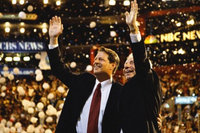
After two terms as Vice President, Gore ran for President. In the Democratic primaries, Gore faced an early challenge from Bill Bradley. Bradley withdrew from the race in early March 2000 after Gore won every primary election. In August 2000, Gore surprised many when he selected United States Senator Joe Lieberman to be his vice-presidential running mate. Lieberman, who was a more conservative Democrat than Gore, had publicly blasted President Clinton for the Monica Lewinsky affair. Many pundits saw Gore's choice of Lieberman as another way of trying to distance himself from the scandal-prone Clinton White House. Lieberman was also the first Jewish nominee on a major party's national ticket. During the entire U.S. presidential election, 2000, Gore was neck and neck in the polls with Republican Governor of Texas George W. Bush. On election day, the results were so close that the outcome of the race took over a month to resolve, highlighted by the premature declaration of a winner on election night, and an extremely close result in the state of Florida.
The race was ultimately decided by a razor thin margin of only 537 popular votes in Florida -- an astonishingly close margin out of some 105 million votes cast nationwide. Florida's 25 electoral votes were awarded to George W. Bush only after numerous court challenges. Al Gore publicly conceded the election after the Supreme Court in Bush v. Gore voted 7 to 2 to declare the ongoing recount procedure unconstitutional, on the grounds that it was not being carried out statewide, and 5 to 4 to ban further recounts using other procedures.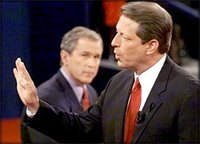
The Florida election has been closely scrutinized since the election. Several irregularities are thought to have favored Bush; others may have given Gore an edge. Irregularities on the Bush side included the notorious Palm Beach "butterfly ballots", which produced an unexpectedly large number of votes for third-party candidate Patrick Buchanan, and a purge of some 50,000 alleged felons from the Florida voting rolls that included many voters who were eligible to vote under Florida law. Many Bush supporters, however, believed that an unfair advantage was given to Gore when all major news networks, early on, prematurely projected Gore as the winner of Florida's 25 electoral votes at 7:52 PM Eastern Time. This happened before the polls closed in 10 small Florida counties in the heavily Republican western panhandle which are in the Central Time Zone, and thus closed at 7 PM Central Time (8 PM Eastern). Some have thought that this depressed the pro-Bush vote in that area -- although none have shown any proof that voters who were at home and saw the networks call the election failed to go vote in the last 8 minutes. [13] (http://archives.cnn.com/2001/ALLPOLITICS/stories/02/02/cnn.report/cnn.pdf) During the numerous recounts (which made the phrase "hanging chads" infamous in the American vocabulary), there were also allegations of both pro-Bush and pro-Gore tampering by low-level operatives in the controversial counties. [14] (http://www.newsmax.com/archives/articles/2000/11/26/230955.shtml) It is unclear what effect, if any, this may have had. And while the Gore camp, fought (with some success) to keep overseas absentee votes out in counties thought to be pro-Bush, Bush operatives similarly (albeit wihile drawing less attention to their efforts) prevented the counting of overseas absentee votes in strong Democratic counties. Both sides contended that the votes were cast after election day, and since many of the envelopes did not have cancelled stamps, it was not clear when the votes were cast. Reports later surfaced that many overseas voters attempted to vote only after learning of the closeness of the Florida vote.
The list of possible controversies, in fact, is so long that we will undoubtedly never know with absolute certainty who "should" have won the election.
Some commentators still see such irregularities, and the legal maneuvering around the recounts as casting doubt on the legitimacy of the vote; as a matter of law, however, the issue was settled when the U.S. Congress accepted Florida's electoral delegation, only after a challenge to the Florida electors was presented in the congressional chambers on January 6, 2001 by members of the Congressional Black Caucus who could not secure the signature of one Senator to bring the challenge to a debate.
P88329-16.jpg
Concern about the possible disenfranchisement of voters in the Florida vote led to widespread calls for electoral reform in the United States, and ultimately to the passage of the Help America Vote Act, which authorized the United States federal government to provide funds to the states to replace their mechanical voting equipment with electronic voting equipment. However, this has led to new controversies, because of the security weaknesses of the computer systems, the lack of paper-based methods of secure verification, and the necessity to rely on the trustworthiness of the manufacturers whose employees also count those votes. Although Gore won the nationwide popular vote by more than 500,000 votes, receiving the most votes of any Democrat in U.S. history, he lost the election by five electoral votes (with one DC Elector, pledged to Gore, casting a blank ballot to protest the District's lack of representation in Congress).
Gore lost his home state of Tennessee, making him the first presidential candidate since South Dakota Democratic Senator George McGovern in 1972 to lose his home state in a presidential election.
For more information on Al Gore's 2000 campaign, see: Al Gore presidential campaign, 2000
For more information on the 2000 election, see: U.S. presidential election, 2000
For other information, see: Al Gore controversies
Post vice-presidency
Private citizen
Following his election loss, a bearded Gore accepted visiting professorships at Columbia University's Graduate School of Journalism, Middle Tennessee State University, University of California Los Angeles, and Fisk University. In late 2001, Al Gore became a Senior Advisor to Google and Vice Chairman of Los Angeles-based financial firm Metropolitan West Financial LLC.
Following the November 5, 2002 midterm elections Gore re-emerged into the public eye with a 14-city book tour and a well-orchestrated "full Gore" media blitz which included a pair of policy speeches. On September 23, Gore delivered a speech on the impending War with Iraq and the War on Terrorism that generated a fair amount of commentary. Less than two weeks later, on October 2, he made a speech on Bush's handling of the economy to the Brookings Institution. Also, during this time period Gore guest starred on several programs such as The Late Show with David Letterman and Saturday Night Live, appearing much more relaxed and funnier as a private citizen than he did while holding public office.
Goresnl.jpg
In 2003 Gore joined the board of directors of Apple Computer. On the political front, Gore kept his promise of staying involved in public debate when he offered his criticism and advice to the Bush Administration on key topics such as the Occupation of Iraq, USA Patriot Act, and environmental issues, most notably global warming. Gore also continued to visit campuses across the nation lecturing on issues such as race, media, and democracy.
On April 10, 2004, Gore met with the 9-11 Commission in private to give his testimony on what his administration did to prevent terror attacks. In a statement after the three-hour session, the commission said he was candid and forthcoming, and it thanked him for his "continued cooperation." [15] (http://asia.news.yahoo.com/040409/ap/d81rfbt80.html)
In the summer of 2004, Gore teamed up with MoveOn.org, to promote the new scientific fiction film, The Day After Tomorrow. Although Gore said the movie was a far-fetched example of global warming, he said the movie would escalate public debate on the issue.
In May 2005, Gore was awarded a lifetime achievement award for three decades of contributions to the Internet. The Webby Awards, which are widely hailed as the Oscars of the web, "wanted to set the record straight" about Al Gore and the Internet once and for all. Tiffany Shlain, the awards' founder and chairwoman said, "It's just one of those instances someone did amazing work for three decades as congressman, senator and vice president and it got spun around into this political mess," Shlain said.
Television network
On May 4, 2004, INdTV Holdings, a company co-founded by Gore and Joel Hyatt, purchased cable news channel NewsWorld International from Vivendi Universal. The new network will not have political leanings, Gore said, but will serve as an "independent voice" for a target audience of people between 18 and 34 "who want to learn about the world in a voice they recognize and a view they recognize as their own."
"This is not going to be a liberal network or a Democrat network or a political network in any way, shape or form," Gore said. Other reports say that Gore hopes that the channel will help change the tide of "consolidation and conglomeratization" of the media by leading the change to "democratization."
Current.jpg
The news network is said to be a combination between CNN and MTV and would try to reach young viewers in the 18-24 age group.
NewsWorld International is currently seen in 19 million homes across the country and features 24-hour international news programming provided by the Canadian Broadcasting Corporation, which will continue to produce news content for Gore's new network.
On April 4, 2005, the former Vice President and business partner Hyatt announced that they have changed the name of the network from INdTV to Current. The new television network will launch worldwide on August 1, 2005, and will feature various "pod" segments. These "pod" segments are videos between 5 seconds and 15 minutes, and are designed by the network's viewers. Viewers will also be able to pick their favorite videos and get instructions on the Internet on how to construct and their own segments. [16] (http://www.msnbc.msn.com/id/7433219/site/newsweek/)
It was also announced that Current will team up with Google to provide twice-hourly updates on popular web searches. [17] (http://www.webrankinfo.com/english/seo-news/topic-3212.htm)
Investment firm
In late 2004, it was announced that Al Gore had launched and will chair an investment firm to seek out companies taking a responsible view on big global issues like climate change.
Gore's group, Generation Investment Management, was created to assist the growing demand for an investment style which can bring returns by blending traditional equity research with a focus on more intangible non-financial factors such as social and environmental responsibility and corporate governance.
2004 presidential election
Initially, Al Gore was touted as a logical opponent of George W. Bush in the 2004 United States Presidential Election. "Re-elect Gore!" was a common slogan among many Democrats who felt the former Vice President had been unfairly cheated out of the presidency, on the grounds that he had won the popular vote and (in the opinion of many) should have won the Electoral College vote. On December 16, 2002 however, Gore announced that he would not run in 2004, saying that it was time for "fresh faces" and "new ideas" to emerge from the Democrats. When he appeared on a 60 Minutes interview, Gore said that he felt if he had run, the focus of the election would be the rematch rather than the issues. Gore's former running mate, Joe Lieberman quickly announced his own candidacy for the presidency, which he had vowed he would not do if Gore ran.
AlGore2004.jpg
Despite Gore taking himself out of the race, a handful of his supporters formed a national campaign to "draft" him into running. However, that effort largely came to an end when Gore publicly endorsed Vermont Governor Howard Dean (over his former running mate Joe Lieberman) weeks before the first primary of the election cycle. There was still some effort to encourage write-in votes for Gore in the primaries by a different group of Gore supporters who were separate from the draft movement. Although Gore did receive a small number of votes in New Hampshire and New Mexico, that effort was halted when John Kerry pulled into the lead for the nomination. Gore's endorsement of Dean was helpful to the latter in legitimizing him in the eyes of the establishment faction of the Democratic Party, but it also led the media to dub Dean as the clear front-runner, with the result that his opponents devoted more of their emphasis to opposing him.
On January 15, 2004, Al Gore gave a major policy address in New York City on climate change and the Bush administration's approach to the environment. Accompanied by slides and projector, Gore slammed the Bush administration's attitude towards global warming saying, "There are many who still do not believe that global warming is a problem at all. And it's no wonder: because they are the targets of a massive and well-organized campaign of disinformation lavishly funded by polluters who are determined to prevent any action to reduce the greenhouse gas emissions that cause global warming, out of a fear that their profits might be affected if they had to stop dumping so much pollution into the atmosphere." (However, that day happened to be the coldest day in New York City history. The cold weather in New York helped make this speech especially controversial.)
On February 9, 2004, on the eve of the Tennessee primary, Gore gave what many consider his harshest criticism of the president yet when he accused George W. Bush of betraying the country by using the 9/11 attacks as a justification for the invasion of Iraq. "He betrayed this country!" Mr. Gore shouted into the microphone. "He played on our fears. He took America on an ill-conceived foreign adventure dangerous to our troops, an adventure preordained and planned before 9/11 ever took place." Gore also urged all Democrats to unite behind their eventual nominee proclaiming, "any one of these candidates is far better than George W. Bush." In March 2004 Gore, along with former Presidents Bill Clinton and Jimmy Carter, united behind Kerry as the presumptive Democratic nominee.
AlGoreSpeaking2004.jpg
On April 28, 2004, Gore announced that he would be donating $6 million to various Democratic Party groups. Drawing from his funds left over from his 2000 presidential campaign, Gore pledged to donate $4 million to the Democratic National Committee. The party's Senate and House committees would each get $1 million, and the party from Gore's home state of Tennessee would receive $250,000. In addition, Gore announced that all of the surplus funds in his "Recount Fund" from the 2000 election controversy that resulted in the Supreme Court halting the counting of the ballots, a total of $240,000, will be donated to the Florida Democratic Party.
In his speech, Gore stressed the importance of voting and having every vote counted, a point that foreshadowed the 2004 U.S. election voting controversies.
On May 26, 2004, Gore gave a highly critical speech on the Iraq crisis and the Bush Administration. In the speech, Gore demanded Secretary of Defense Donald Rumsfeld, National Security Advisor Condoleezza Rice, Director of Central Intelligence George Tenet, Deputy Secretary of Defense Paul Wolfowitz, Undersecretary of Defense for Policy Douglas Feith, and Under Secretary of Defense for Intelligence Stephen Cambone all resign for encouraging policies that led to the abuse of Iraqi prisoners and fanned hatred of Americans abroad. During the fiery speech, which lasted more than an hour, Gore called the Bush administration's Iraq war plan "incompetent" and called George W. Bush the most dishonest president since Richard Nixon, who resigned the office of the presidency in 1974 following the Watergate scandal.
Gore also decried the abuse of prisoners in Abu Ghraib Prison in Iraq, saying, "what happened at that prison, it is now clear, is not the result of random acts of a few bad apples. It was the natural consequence of the Bush Administration policy."
As the first major speaker at the 2004 Democratic National Convention, Gore held himself out as a living reminder that every vote counts. "Let's make sure not only that the Supreme Court does not pick the next president, but also that this president is not the one who picks the next Supreme Court," said Gore. Gore directed remarks to supporters of third-party presidential candidate Ralph Nader, who abandoned the Democratic Party four years ago, asking them, "Do you still believe that there was no difference between the candidates?"
On October 18, 2004, Al Gore delivered his final major policy speech of the 2004 political season. In an hour long presentation, Gore concluded that, "I'm convinced that most of the president's frequent departures from fact-based analysis have much more to do with right-wing political and economic ideology than with the Bible."
2008 presidential election
Gore2008small.jpg
Although the Vice President maintains that he has no intention to run for political office again, he has also said that he cannot rule it out completely. Therefore, on November 3, 2004, several groups launched an effort to try to influence the former vice president to seek the presidency in 2008. In January of 2005, several sources reported that Gore was considering running in 2008. As of April 5, 2005, Gore has not yet made any comments on any of the group's efforts.
On April 27, 2005, Gore gave an hour long speech lambasting the GOP's effort to do away with the legislative filibuster. In response to Senate Majority Leader Bill Frist, who for weeks has repeated threats to impose the "nuclear option" if Senate Democrats did not stop blocking judicial nominees via the filibuster, Gore said, "Their grand design is an all-powerful executive using a weakened legislature to fashion a compliant judiciary in its own image. The Senate has confirmed 205 or over 95 percent of President Bush's nominees. Democrats have held up only 10 nominees, less than 5 percent. Compare that with the 60 Clinton nominees who were blocked by Republican obstruction between 1995 and 2000. What is involved here is a power grab," Gore said. Gore also took aim at what he called "religious zealots" who claim special knowledge of God’s will in American politics. He went on to say, "They even claim that those of us who disagree with their point of view are waging war against ‘people of faith.’ How dare they!" This was Gore's first major policy speech of 2005 and also the first one since the defeat of Democratic hopeful, John Kerry, in late 2004.
Views and controversies
Al Gore's views are roughly those of a populist liberal. Gore is now a strong supporter of legalized abortion on demand, free trade, and tax cuts to affect personal behavoir and tax increases to expand Government's influence and revenue base. He was a vocal opponent of the 2003 invasion of Iraq and Republican attempts to pass a Balanced Budget Amendment to the US Constitution.
Though Gore has gradually moved politically further left into the mainstream of the Democratic Party, he was once a moderate-to-conservative lawmaker. Early in his career, he was pro-life; his Congressional voting record was rated by one source as 84% anti-abortion. Through the late 1980s, Gore maintained that abortion destroyed innocent human life. He had adopted a pro-choice position by 1988, when he sought the Democratic presidential nomination. Conservatives have criticized his change as stemming from expedience rather than conviction.
Gore has also been involved in a number of controversies. His statements on issues such as the 'creation of the internet,' and the environment had been cast in the popular media as either disingenuous or politically radical. Gore claimed he could not be held legally accountable for illegal fundraising at a Buddhist temple and illegal use of his Government office and telephone for political fundraising (violations of the Hatch Act) because there was "no controlling legal authority" - an apparant reference to the law's never having been tested in the US Supreme Court. He apparantly succeeded with this defense as he was never charged with the crime.
External links
Template:Wikiquote Template:Wikisource author
General sites
- Al Gore Support Center 2008 - The Home of Hardcore Gore Supporters (http://www.algoresupportcenter.com/)
- Al Gore '08 - Organize, Discuss, Act (http://www.algore-08.com/)
- Current TV (http://www.current.tv)
- Patriots for Al Gore PAC (http://www.patriotsforgore.com/)
- The Official NARA Online Office Of Vice President Gore (1993-2001) (http://clinton5.nara.gov/WH/EOP/OVP/VP.html)
- Clinton-Gore Administration Accomplishments (http://clinton3.nara.gov/WH/Accomplishments/)
- The Life of Al Gore - Washington Post (http://www.washingtonpost.com/wp-srv/politics/campaigns/wh2000/stories/goremain100399.htm)
- Al Gore on the Issues (http://www.issues2002.org/Gore.htm)
- A New Approach for a New Century, International Press Institute World Congress, April 2000 (http://www.freemedia.at/Boston_Congress_Report/boston3.htm)
- Political Donations Made by Al Gore (http://www.newsmeat.com/washington_political_donations/Al_Gore.php)
Recent speeches by Al Gore
- Gore Slams GOP's Efforts To End Filibuster (http://s8.invisionfree.com/Al_Gore_Support/index.php?showtopic=2474&st=0&#entry7932723)
- Gore Charges The Bush Administration With A Failed Presidency (http://www.xpatusa.com/Al_Gore2.htm)
- Gore's Remarks At The 2004 Democratic Convention (http://www.nytimes.com/2004/07/26/politics/campaign/26TEXT-GORE.html)
- Gore Says Bush Lied To Push For War In Iraq (http://s8.invisionfree.com/Al_Gore_Support/index.php?showtopic=100)
- Gore Calls for the Resignation of the Bush Team (http://www.moveonpac.org/gore/)
- Gore Speaks on the Use of "Fear" in Politics (http://www.moveon.org/front/gore.html) - (another version) (http://algoresupport.proboards19.com/index.cgi?board=newsalerts&action=display&num=1076373683&start=0)
- Gore Speaks on Global Warming and the Environment (http://www.moveon.org/gore3/speech.html)
- Gore Calls for the Repeal of the Patriot Act (http://www.moveon.org/gore/speech.html)
- Gore Blasts Bush for Mis Leading America (http://www.moveon.org/gore-speech.html)
- Gore Speaks On The Build Up To War With Iraq and The War On Terror (http://www.commonwealthclub.org/archive/02/02-09gore-speech.html)
- Gore Speaks On Matching our Nation's Economic Course to Our Current Realities (http://www.gwu.edu/~action/2004/gore/gore100202sp.html)
Al Gore's Current
- Official website of the television station Current (http://www.current.tv)
Al Gore and the Internet
- Snopes analyzes the statement that Gore claimed to "invent" the Internet (http://www.snopes.com/quotes/internet.htm)
- An Examination of the Origins of the "Al Gore invented the Internet" Memo (http://commons.somewhere.com/rre/2000/RRE.Al.Gore.and.the.Inte.html) - Bad Link?
- Full Text of Vint Cerf and Robert Kahn's Email on Gore and the Internet (http://www.politechbot.com/p-01394.html)
- A Wired News Piece on Al Gore's Claimed Contribution to the Internet (http://www.wired.com/news/politics/0,1283,18390,00.html)
Al Gore myths and media bias
- Gore Myths Page (http://www.algoresupportcenter.com/goretruth.html)
- Media Bias Against Al Gore Exposed (http://www.eriposte.com/media/bias/media_bias_gore.htm)
| Preceded by: Lloyd Bentsen | Democratic Party Vice Presidential candidate 1992 (won), 1996 (won) | Succeeded by: Joe Lieberman | ||||
| Preceded by: Dan Quayle | Vice President of the United States January 20, 1993 – January 20, 2001 | Succeeded by: Dick Cheney | ||||
| Preceded by: Bill Clinton | Democratic Party Presidential candidate 2000 (lost) | Succeeded by: John Kerry
|
||||

